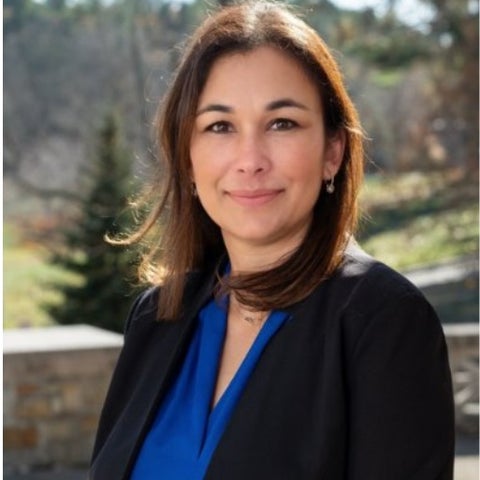Fabiola Lalande
Associate Professor of Nursing, RN-BSN and MSN Programs Chair

Dr. Fabiola Dias Lalande is an Associate Professor of Nursing and Chair of the RN-BSN and MSN programs at Emmanuel College. With extensive experience in nursing education, she is passionate about creating inclusive, engaging, and evidence-based learning experiences that prepare students for a successful and fulfilling career. Her scholarly interests include experiential learning and fostering cultural competence in nursing. Dr. Lalande has received an Excellence in Simulation Instruction award from MCPHS University.
Dr. Lalande is a member of Sigma Theta Tau International and the International Association of Latino Nurse Faculty/Nurse Leader. She also serves on editorial review panels for several leading nursing journals.
Dr. Fabi Lalande was born and raised in Brazil. Outside work, she enjoys hiking, traveling, and spending quality time with her husband, children, and friends.
What do you love about Emmanuel College?
Fabi is a proud alumna of Emmanuel College, where she earned her RN-BSN degree. The college has held a special place in her heart ever since. Her most cherished memories as a student include collaborating with peers, the support of faculty, and experiencing the warmth of the Emmanuel community, where she formed lasting friendships that continue to enrich her life today. At Emmanuel, she was challenged to reflect deeply on her beliefs and values, fostering personal and professional growth. She is honored to return years later as a faculty member and Chair of the RN-BSN and MSN programs, where she is committed to continuing the legacy that shaped her own professional journey.
Doctor of Nursing Practice, Regis College
Master of Science in Nursing, Regis College
Bachelor of Science in Nursing, Emmanuel College
Associate Degree in Nursing, Bunker Hill Community College
Dr. Lalande teaches undergraduate and graduate courses in the Nursing Graduate and Professional Programs.
Publications
Lalande, F. D. (2024). The Effects of Reverse-Role Simulation on Nursing Students’ Ethnocultural Empathy: A Quantitative Study. Nursing Education Perspectives. https://doi.org/10.1097/01.NEP.0000000000001238
Lalande, F. (2014). Healthcare Standardization of Color-Coded Alerts. Massachusetts Report on Nursing, 12(3), 9. http://www.nursingald.com/publications/1083.
Media Appearances
2025 NLN Nursing EDge Unscripted Podcast, Featured guest. "Reverse-Role Simulation's Impact on Nursing Students' Ethnocultural Empathy." National League for Nursing.
Presentations
2024 Lalande, F. D. Reverse-Role Simulation's Impact on Nursing Students' Ethnocultural Empathy. Podium Presentation. Transform 2024 Nursing Conference by the American Association of Colleges of Nursing, New Orleans, LA.
2023 Gallagher, K., Lalande, F., & Goodman, J. Promoting Student Engagement in the Classroom Setting: Bringing clinical to the classroom. Oral Presentation for Faculty Development. Lawrence Memorial/Regis College, Medford, MA.
2023 Lalande, F. D. Reverse-Role Simulation's Impact on Nursing Students' Ethnocultural Empathy. Podium Presentation. Nurse Educator Research Conference by National League for Nursing, Washington, DC.
2023 Lalande, F. D. Using Simulation to Develop Empathy. Oral Presentation for Faculty Development. Lawrence Memorial/Regis College, Medford, MA.
2022 Lalande, F. D. Reverse-Role Simulation's Impact on Nursing Students' Ethnocultural Empathy. Poster Presentation. Nuts and Bolts Virtual Conference by Nurse Tim.
2020 Lalande, F. D. & Wallace, J. Using Zoom to Facilitate Student Engagement and Formative
Assessment. Oral Presentation for Faculty Development. Lawrence Memorial/Regis College, Medford, MA.
2020 Lalande, F. D. Overview of the Role of the Clinical Adjunct Faculty in the Clinical Setting:
Responsibilities and tips. Guest Speaker. Adjunct Faculty training, MCPHS University, Boston, MA.
Fabi's research interests include empathy development, healthcare experiences of diverse patient populations, and experiential learning. She has studied the use of reverse-role simulation to train ethnocultural empathy in nursing students to promote culturally sensitive care delivery.